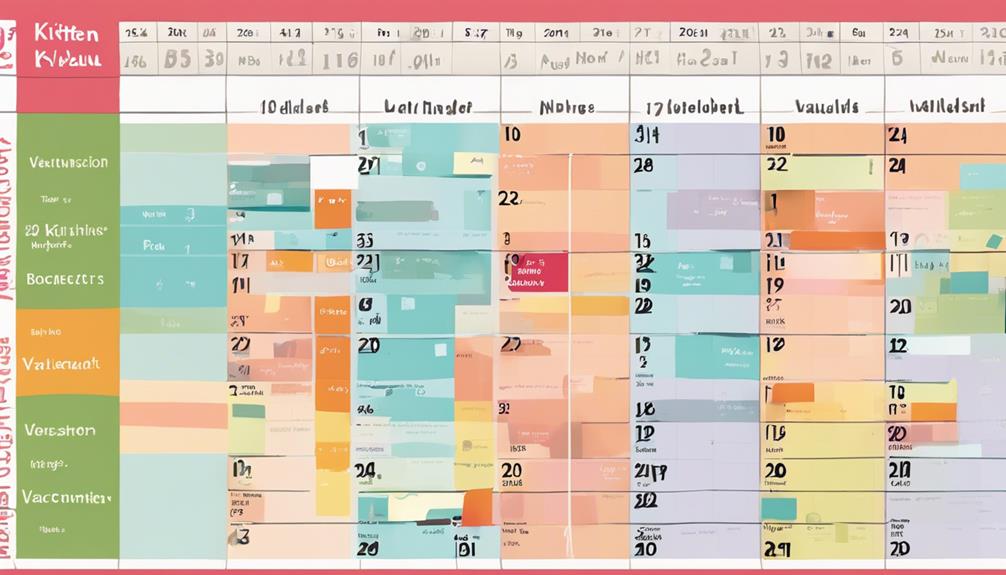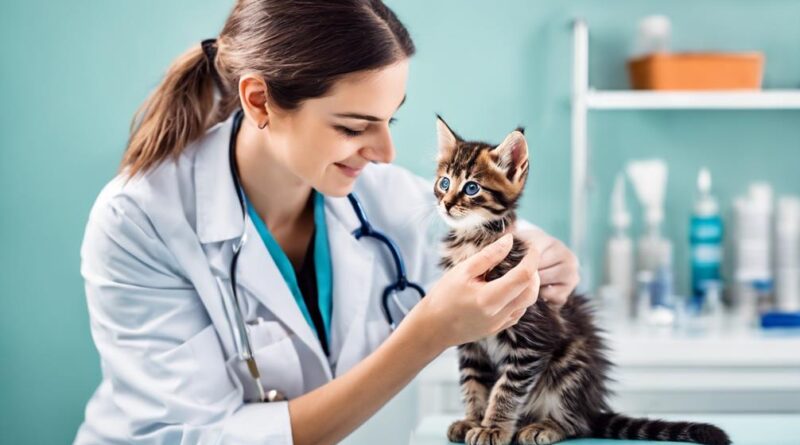Optimal Timing for Kitten Vaccinations: A How-to
When it comes to ensuring your kitten's health, the timing of vaccinations is crucial. But do you know the optimal schedule to follow for your furry friend's well-being?
Understanding the key factors that influence when to vaccinate your kitten can make a significant difference in their protection against diseases.
Stay tuned to discover the expert-recommended guidelines that will help you navigate this essential aspect of kitten care effectively.
Importance of Early Vaccination
Early vaccination is crucial to protect your kitten from serious diseases. Providing early protection through vaccinations is essential to ensure your kitten develops vital immunity against harmful viruses and bacteria. Kittens are born with some immunity from their mother's milk, but this protection only lasts a few weeks. As your kitten's maternal immunity begins to wane, it becomes susceptible to various infectious diseases. This is why timely vaccinations are necessary to bridge the immunity gap and safeguard your kitten's health.
Core Vaccines for Kittens
To ensure your kitten's optimal health and protection against common diseases, core vaccines are essential. These vaccines are designed to provide protection against highly contagious and severe illnesses that kittens are susceptible to. Here are some key points to consider about core vaccines for kittens:
- Vaccine Effectiveness: Core vaccines have been proven to be highly effective in preventing diseases such as feline viral rhinotracheitis, calicivirus, panleukopenia, and rabies. These vaccines help to stimulate your kitten's immune system to recognize and fight off these pathogens effectively.
- Immune Response: When core vaccines are administered to kittens, they trigger the production of specific antibodies that target the disease-causing agents. This immune response is crucial for developing immunity and providing long-lasting protection against these illnesses.
- Preventive Measures: Core vaccines play a vital role in preventing outbreaks of diseases among kittens in multi-cat households or shelters. By ensuring that all kittens receive their core vaccinations, you contribute to creating a healthier environment for these vulnerable animals.
- Regular Boosters: To maintain optimal immunity, kittens typically require booster shots at specific intervals. These boosters help to reinforce the immune response and ensure that your kitten remains protected against infectious diseases as they grow and mature.
Recommended Vaccination Schedule
When considering the optimal health and protection of your kitten, understanding the recommended vaccination schedule is crucial. Vaccine types play a significant role in this schedule, as kittens require a series of vaccinations to build immunity against common and potentially deadly diseases. The core vaccines for kittens typically include those for feline viral rhinotracheitis, calicivirus, panleukopenia (FVRCP), and rabies. These vaccines are essential to prevent severe illnesses and ensure your kitten leads a healthy life.
The recommended vaccination schedule for kittens is designed to maximize their immune response to these vaccines. Generally, kittens should start their vaccinations at around 6-8 weeks of age. They'll need multiple doses of the core vaccines, usually given 3-4 weeks apart, until they're about 16 weeks old. Boosters are then administered at specific intervals to maintain immunity throughout the cat's life.
Understanding the importance of timing in vaccinations is crucial to ensure your kitten develops a strong and lasting immune response. By following the recommended schedule and completing the full series of vaccinations, you're providing your kitten with the best possible protection against common feline diseases. Remember, timely vaccinations are key to safeguarding your kitten's health and well-being.
Factors Influencing Timing
Considering the health and protection of your kitten, various factors influence the optimal timing for vaccinations to ensure maximum effectiveness.
- Maternal antibodies: Kittens receive essential antibodies through their mother's milk. These maternal antibodies help provide temporary immunity against certain diseases. However, these antibodies can also interfere with the kitten's response to vaccinations. It's crucial to time vaccinations so that maternal antibodies have decreased sufficiently to allow the kitten's immune system to respond effectively to the vaccine.
- Immune system development: A kitten's immune system isn't fully developed at birth. Over the first few weeks of life, the immune system gradually matures, becoming better equipped to recognize and fight off harmful pathogens. Vaccinations administered too early may not trigger a robust immune response, while delaying vaccinations excessively can leave the kitten vulnerable to infectious diseases.
- Vaccine efficacy: The timing of vaccinations is crucial to ensure that the vaccine provides adequate protection. Administering vaccines when the kitten's immune system is primed and ready to respond optimally enhances the vaccine's efficacy, increasing the likelihood of long-lasting immunity.
- Health status and environment: Factors such as the kitten's overall health, exposure to other animals, and prevalent diseases in the area can also influence the timing of vaccinations. It's important to consult with a veterinarian to determine the most appropriate vaccination schedule based on these individual factors.
Side Effects and Risks
Factors such as your kitten's age and overall health status can influence the potential side effects and risks associated with vaccinations. Common side effects of vaccinations in kittens may include mild fever, lethargy, or soreness at the injection site. These side effects are usually mild and temporary, lasting only a day or two. However, more serious risks such as allergic reactions can occur, although they're rare. Signs of an allergic reaction may include facial swelling, difficulty breathing, or vomiting. If you notice any of these symptoms after your kitten's vaccination, contact your veterinarian immediately.
To minimize the risks associated with vaccinations, there are some precautions you can take. Make sure to inform your veterinarian about your kitten's complete medical history, including any known allergies or previous adverse reactions to vaccines. Your vet may recommend pre-medication with antihistamines or other medications if your kitten is at a higher risk of developing an allergic reaction. Additionally, it's essential to follow the recommended vaccination schedule and avoid over-vaccination, as this can increase the likelihood of side effects.
Vaccination Timing for Outdoor Kittens
To ensure the optimal protection for your outdoor kitten, it's crucial to understand the recommended vaccination timing. Outdoor exposure poses a higher risk for your kitten to encounter various diseases, making timely vaccinations essential. Here's what you need to know:
- Early Vaccination: Kittens should start their vaccination series around 6 to 8 weeks of age. This is crucial, especially for outdoor kittens, as they're more susceptible to diseases due to their environment.
- Boosting Immunity: Vaccines need time to stimulate the immune system adequately. Multiple doses are typically required to ensure full immunity. For outdoor kittens, this process is crucial given their increased exposure to pathogens.
- Duration of Immunity: The immunity developed through vaccinations isn't lifelong. Understanding the duration of immunity provided by each vaccine is essential to plan for booster shots. Outdoor kittens may need more frequent boosters due to their higher risk of exposure.
- Monitoring and Adapting: Regular vet check-ups are vital to monitor your kitten's immunity levels and adjust the vaccination schedule accordingly. For outdoor kittens, this monitoring is even more critical due to their continual exposure to potential diseases.
Boosters and Follow-up Shots

For optimal protection, ensure timely administration of boosters and follow-up shots for your outdoor kitten. Booster reminders are crucial to maintain your kitten's immunity against common diseases. Boosters are additional doses of vaccines given after the initial series to reinforce the immune response. Missing boosters can leave your kitten vulnerable to infections, so mark your calendar or set up reminders to stay on track.
Follow-up protocols are equally important to ensure your kitten's continued well-being. These protocols involve scheduling appointments with your veterinarian to monitor your kitten's health and administer any necessary vaccinations. Follow-up shots may be needed to boost immunity or provide protection against new threats. Your vet will advise you on the appropriate schedule based on your kitten's lifestyle and risk factors.
Consulting Your Vet for Guidance
Ensure you consult your vet for tailored guidance on your outdoor kitten's vaccination schedule and overall health management. Your vet is a valuable resource when it comes to ensuring the proper care and vaccination of your furry friend.
Here are some key reasons why consulting your vet is essential:
- Vet Recommendations: Vets have the expertise and experience to provide personalized recommendations based on your kitten's specific needs. They can assess your kitten's health status, lifestyle, and potential exposure risks to tailor a vaccination schedule that ensures optimal protection.
- Early Detection of Health Issues: Regular check-ups with your vet not only help with vaccinations but also enable early detection of any underlying health issues. Vets can identify problems before they escalate, ensuring timely intervention and proper care for your kitten.
- Guidance on Nutrition and Wellness: Vets can offer valuable advice on nutrition, exercise, and overall wellness to keep your kitten healthy and happy. They can recommend appropriate diets, supplements, and lifestyle modifications to promote your kitten's well-being.
- Emergency Preparedness: In case of emergencies or sudden health concerns, having a relationship with your vet ensures quick access to professional help. Your vet can guide you on immediate steps to take and provide emergency care if needed, contributing to your kitten's overall health and safety.
Frequently Asked Questions
Can Kittens Receive Vaccinations if They Are Currently Sick or on Medication?
If your kittens are sick or on medication, it's best to wait before getting them vaccinated. Sick kittens may not respond well to the vaccines, and medications could interfere with the effectiveness.
Talk to your vet about vaccination alternatives and the best timing for your kittens' health conditions. Prioritize their well-being by ensuring they're in optimal health before proceeding with vaccinations.
Are There Any Alternative Vaccination Schedules for Kittens With Specific Health Conditions?
If your kitten has specific health conditions like allergy concerns, there may be alternative vaccination schedules available. These schedules could be adjusted to accommodate your kitten's immune response and ensure effective protection.
It's important to consult with your veterinarian to determine the best approach for vaccinating your kitten while considering their individual health needs. By working closely with your vet, you can develop a tailored vaccination plan that prioritizes your kitten's well-being.
How Long Should I Wait After Adopting a Kitten Before Starting the Vaccination Process?
After adopting a kitten, it's crucial to wait a short period before beginning the vaccination process. This waiting period allows your new furry friend to settle into their new environment and adjust before introducing the stress of vaccinations.
Once you've given your kitten some time to acclimate, you can then start the vaccination process to ensure they're protected against common diseases and infections.
Can Kittens Receive Vaccines if They Have Already Been Exposed to Certain Diseases?
If your kittens have been exposed to certain diseases, they may still benefit from vaccines. However, it's essential to consider factors like immunity duration and treatment options. Your vet can provide guidance on the best course of action.
It's crucial to ensure your kittens receive the necessary vaccinations to protect their health, even if they've been exposed to diseases. Always consult a professional for the most appropriate advice.
Are There Any Specific Guidelines for Vaccinating Kittens From Multi-Cat Households?
When vaccinating kittens in multi-cat homes, consider the socialization challenges and the needs of any immunocompromised kittens. Follow a schedule recommended by your vet to protect all your feline friends.
Keep track of each kitten's vaccinations to ensure they're up-to-date and properly protected. Regular vet check-ups can help monitor the health of your kittens and address any concerns promptly.
Stay informed and prioritize the well-being of your furry family members.
Conclusion
In conclusion, ensuring your kitten receives vaccinations at the optimal timing is crucial for their health and well-being. By following the recommended schedule and consulting your vet for guidance, you can help protect your furry friend from serious diseases.
Remember, early vaccination is key to building a strong immune system and keeping your kitten happy and healthy for years to come. Don't delay in providing this essential care for your new feline companion.
